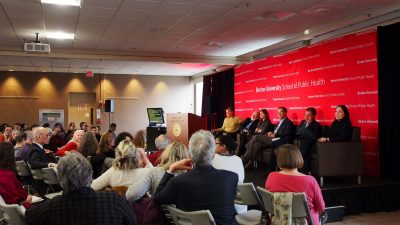
From Boston to Zambia, death is a universal experience regardless of wealth. In a recent symposium, scholars from a variety of disciplines gathered at Boston University to offer insights on death from across the globe.
Tuesday’s talk, titled “Death and Dying: A Population Health Perspective,” was part of the School of Public Health’s quarterly Dean’s Symposia and took place in the Hiebert Lounge in the School of Medicine. The talk was open to members of the BU community and the public and addressed grief and empathy.
It was co-hosted by the College of Communication, College of Arts and Sciences Center for the Humanities, School of Public Health Program for Global Health Storytelling and the Pulitzer Center.
The program was divided into three sections that spanned throughout the day with brief breaks in-between. Opening remarks were provided by Sandro Galea, dean and Robert A. Knox Professor at SPH, and Jon Sawyer, executive director of the Pulitzer Center.
The first installment discussed how society perceives death. It included five speakers and moderator Sharon Begley, a senior science writer at STAT.
During the second part, Barbara Moran, an alumna of the College of Communication and senior producing editor for WBUR’s environmental vertical, moderated a discussion among five additional speakers who delved into strategies to handle grief.
In the third component, four speakers and moderator Dianne Gray, chief innovation and advocacy officer for Acclivity Health Solutions, took to the stage to discuss the aftermath of death, as well as the presence of grief throughout life.
“We grieve while we live, we don’t just grieve after the death of someone,” Gray said in the talk. “We grieve every day in some way. We also grieve throughout illness. We grieve throughout prognosis and diagnosis. We grieve in so many ways.”
Gray said Americans should become more empathetic and engaged in ending the stigma around grief that persists today.
“I promise you that doing nothing will continue the legacy that we have, which is of isolation and a lack of caring, and it’s not good enough anymore, it’s not acceptable,” she said during the presentation. “There is no reason in our country that we continue the legacy of shame and stigma that surrounds grief.”
During the final section, Dr. Christopher Gill, associate professor of global health in SPH, discussed his current research project, which focuses on child mortality and grief counseling for families in less developed areas, particularly in Lusaka, Zambia.
Gill explained in an interview that some Americans are apathetic toward mortality in less affluent countries because death happens more frequently in these areas.
“I morally believe that every life is pretty much equally valuable, and the loss of a child is as painful in Africa as it is anywhere,” Gill said. “This notion that just because death is more common can mean that somehow a mother who loses her baby in Zambia is less devastated by that than a mother who loses her child in Boston, … I find so painful and unacceptable.”
Gill explained that his research team has been running a field study for about a year-and-a-half with the Bill and Melinda Gates Foundation. He said the team is working to understand how many children in Lusaka are dying of two common pediatric infections: pertussis and respiratory syncytial virus.
The project is designed to run over a three-and-a-half year period and study the presence of these infections in children under six months of age who die in Lusaka, according to Gill. He said that the team has studied more than 1,100 infants so far.
According to Gill, this study comes with serious complications for the families of the deceased children, since the children must be enrolled in the study immediately after they die.
“We have to get informed consent from a family that has just suffered a total devastating loss and is shattered,” Gill said in an interview. “Presumably, the last thing in the world they want to do is talk about a research study.”
Gill’s team decided to offer grief counseling irrespective of whether the families give informed consent to study their children or not. He said his team is interested in setting up a simple a protocol for grief counseling that can be implemented by people without advanced degrees in psychiatry, psychology or social work.
“Almost everybody you know has lost somebody in their lives and been sad and wounded by that event, and I’m no exception,” Gill said. “We all lose people. To somehow say that this doesn’t matter because it happens more commonly, really trivializes an event that is fundamental to human nature and should be respected wherever it happens.”
Ivy Fan, a freshman in the Questrom School of Business, said she agreed that death is a universal human experience.
“Death affects everyone,” Fan said, “but it also makes life seem more precious.”


























































































































